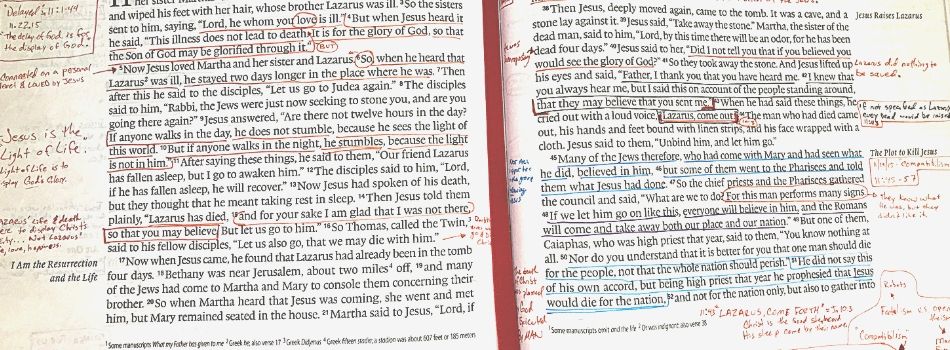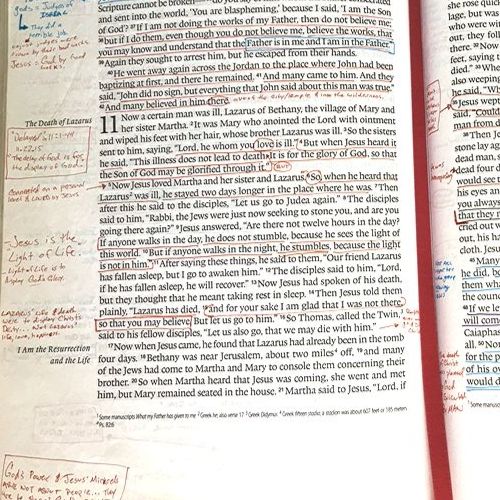
I was just sitting down and looking at my Bible and I was thinking, is it ok to write in a Bible?
It is totally ok and should be encouraged to write in your Bible.
Nowhere in the Bible does it say to Revere and worship the paper. The reverence for the Word of God is about content, not the construction. While I by no means encourage the willful destruction of a Bible, I also discourage worship of the book instead of the Lord. With that disclaimer out of the way, let’s jump right in.
Pros
- You are actually reading the Bible
- Better retention for visual learners
- No ancillary notebooks to lose along the way
- A personalized study Bible, of your own studies
Cons
- Can make certain parts hard to read
- If poorly noted, years later a notation can be meaningless
- A finite amount of notation space
- No redundancy to study/historical notes
What should you write
This is extremely personal and in some cases private things to consider. There is no right way to do something when it comes to worship and learning. Everyone has their own style, pace, approach, and are in different places in their personal walks. With this in mind, a few options I have come across or used myself are prayer guides, sermon notes, personal struggles, prayer requests, written confession…
My top suggestion is “whatever jumps out to you”.
I normally like to write down little nuggets from various sermons I’m listening through. Related scripture is another awesome thing to write down (make sure that the verses aren’t already noted in the footer somewhere).
I love it when I’m reading through a passage for my daily reading and I can have a full sermon with notes and references at my fingertips.
What should you write with
I have some stringent criteria when it comes to pens. I’m not sure if it’s a touch of OCD or my years of formal medical report writing, but I have hard opinions when it comes to my writing implements.
- Fine point is essential when trying to make notations in the margins or even within the written lines.
- Limited bleed or more importantly NO BLEED is critical when trying to notate without running the backside of the page.
- Lack of smearing, if you have ever written with a gel pen, you get it. This can ruin your Bible if you don’t have quick-drying/ limited smearing ink.
- Archival ink matters, in the long run, this prevents fading of the ink. Also, acid-free archival ink won’t deteriorate the paper itself over the years.
- Multiple colors, being able to break out of the blue/black rut can expand your study and notation potential.
My number one favorite Bible writing tool is this set of pens found on Amazon. This set meets all the above parameters without breaking the back.
There are some multicolored sets from Sharpie that work well, though bleeding through the page is a problem in my experience.
Tips for Bible notes
These are just the tip of the iceberg. But here are some quick considerations when thinking about writing notations within your Bible.
- Think about how you want to write out your notes the first few times. Nothing is worse than ending up with weird spacing or misspelling on the first notes in a new Bible.
- Do not rewrite scripture, next to your scripture. I have on occasion transcribed something a pastor has said during a sermon… Only to realize it was the next set of verses.
- Consider the colors you will use and withhold. I use a single color for an entire sermon, special notes in a secondary color. So when I go back to that section in the future I can use a tertiary color. This allows some context and organization.
- Written notes can help to turn a Bible into “your Bible”. This, in my experience, is a huge win for younger believers. It helps to dispel the notion of the cranky old church full of rules while embracing the most important job of the Bible! That purpose was for God to speak to the church, through scripture.
The dangers of over-highlighting
When I was struggling in paramedic school, I approached my instructor for help. When he looked at my study materials he actually laughed. “Bro, if you highlight everything, then what’s the point? It’s just like you didn’t highlight anything and you just have a pink book now”.
This has stayed with me throughout the years and I am much more intentional and efficient with my note-taking and studying in general. All of my notations are now actually considered, instead of my previous approach if highlight everything.
Gifting a “used” Bible
When I returned to the church after a misspent adolescence, this was one of the factors that helped to get me involved with Bible reading. My friend showed me a Bible that he had been gifted by our pastor. This thing had sermon notes, coffee stains, small page rips, and even a little blood stain (funny story).
These imperfections by no means took away from the reading. The love and involvement required to “use” this Bible the way that my pastor had, showed the love for the word that many seem to lack. While I by no means encourage the destruction of the Word of God, I also discourage the almost worshipping of the book itself, displayed by some. If it was meant to be kept perfect, it would have been given to someone like me.
I have passed along, whatever Bible I’m using at the time, a few times now. It’s always great to see the look in a new believer’s eye when you just hand them “your Bible”.
I plan on passing along my current Bible to one of my children. It currently has about 5 years of notations written in it. I am considering switching to a new Bible to “use” that one for a few years. That way each of my kids gets a “seasoned” Bible.
Considering owning more than one Bible
This gives you options. While it is awesome to have my three-pound, lambskin clad Bible for church or study times, I find it impractical to use day to day away from home.
This is where a pocket New Testament can really help out. Practically speaking though this is where your cell phone will probably come into play. I usually have a Bible app, thesaurus and the logos app in one of the titles of my home screen.
In conclusion
Write in your Bible if you feel comfortable doing so. Please do not feel any pressure from this article to start writing in your bible, if you don’t want to. This article was written to provide a sense of freedom to use the Bible. There is no specific “right way” to write in a Bible. However, if you are going to begin taking notes within the pages of your Bible try to remember some of the key Tips. Use quality pens to make your notations. Plan a full thought before writing, instead of just writing what comes to mind. My genuine hope is that this may get some of your to actually read, study, and share the Bible.





